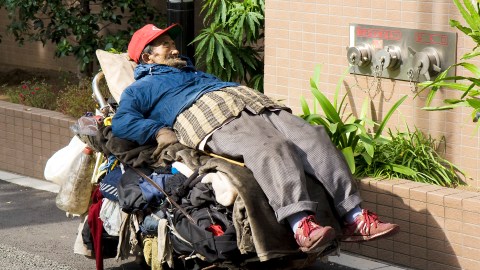Whistler’s Homeless Get a One-Way Ticket Out of Town for the Olympics

With the Winter Olympics just around the icy corner, the host cities are scrambling to handle any last-minute logistics to make the cities of Vancouver and Whistler as sanitized a tourist haven as the world has ever seen. But that also means handling some of the more unsightly aspects of two beautiful, picturesque cities mere weeks before the games begin. And those solutions are coming from some unexpected places.
We’ve already set aside some time to look at Vancouver’s approach to handling what some might call a heroin epidemic. The variety of solutions employed have proven controversial, if not pretty fascinating for anyone curious about the city’s seedy underbelly. But Whistler, essentially a co-host for the games and one of the world’s most-beautiful ski retreats, is also dealing with its own problems in prepping for the games.
With the Olympics displacing a number of the city’s homeless, a migration has occurred, forcing Whistler’s homeless to primarily relocate to neighboring Squamish, home of the region’s only 24-hour emergency shelter. According to online reports, the city has handed local homeless one-way bus tickets, forcing them to get on these buses. While some big Canadian media claim these homeless will return to Whistler after the games, there really isn’t any evidence backing up that claim. Assuming many of these homeless won’t return, the one-way ticket has become an increasingly-popular way for cities to combat homelessness.
In recent years in particular, cities have funded a number of one-way tickets for the local homeless population. Since 2007, New York City has relocated more than 550 families as part of a program initiated by Mayor Michael Bloomberg. In 2009, following the destruction of Typhoon Ondoy, Manila (one of the world’s most-populous cities) relocated the city’s urban poor to government-acquired land outside of the urban center. Rather than presenting a more-sanitized version of the city, the move was to free up area waterways, where these local slums were situated. 2009 even saw Utah institute a program to relocate the state’s homeless cat population.
Of course, this solution is too new to gauge its true effectiveness. It’s certainly a quick fix for events like the Olympics, but simply displacing the problem could shift a big city’s burden on to an area not equipped to deal with an overnight homeless migration. The results of that sudden shift could be one of the main stories to follow long after the Olympic closing ceremonies.




